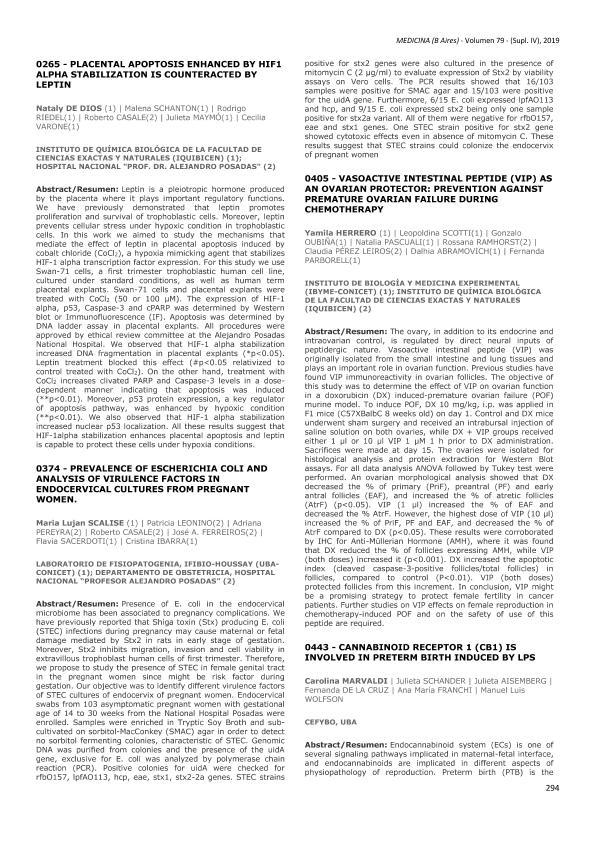Evento
Cannabinoid receptor 1 (CB1) is involved in preterm birth induced by LPS
Marvaldi, Carolina; Schander, Julieta Aylen ; Aisemberg, Julieta
; Aisemberg, Julieta ; de la Cruz, Fernanda; Franchi, Ana Maria
; de la Cruz, Fernanda; Franchi, Ana Maria ; Wolfson, Manuel Luis
; Wolfson, Manuel Luis
 ; Aisemberg, Julieta
; Aisemberg, Julieta ; de la Cruz, Fernanda; Franchi, Ana Maria
; de la Cruz, Fernanda; Franchi, Ana Maria ; Wolfson, Manuel Luis
; Wolfson, Manuel Luis
Tipo del evento:
Reunión
Nombre del evento:
LXIV Reunión Anual de la Sociedad Argentina de Investigación Clínica; LI Reunión Anual de la Asociación Argentina de Farmacología Experimental; XXI Reunión Anual de la Sociedad Argentina de Biología; XXXI Reunión Anual de la Sociedad Argentina de Protozoología; IX Reunión Anual de la Asociación Argentina de Nanomedicinas y VI Reunión Científica Regional de la Asociación Argentina de Ciencia y Tecnología de Animales de Laboratorio
Fecha del evento:
13/11/2019
Institución Organizadora:
Sociedad Argentina de Investigación Clínica;
Asociación Argentina de Farmacología Experimental;
Sociedad Argentina de Biología;
Sociedad Argentina de Protozoología;
Asociación Argentina de Nanomedicinas;
Asociación Argentina de Ciencia y Tecnología de Animales de Laboratorio;
Título de la revista:
Medicina (Buenos Aires)
Editorial:
Fundacion Revista Medicina
ISSN:
1669-9106
Idioma:
Inglés
Clasificación temática:
Resumen
Endocannabinoid system (ECs) is one of several signaling pathways implicated in maternal-fetal interface, and endocannabinoids are implicated in different aspects of physiopathology of reproduction. Preterm birth (PTB) is the leading cause of mortality and morbidity in neonates. It is well known that premature deliveries are mainly associated with infectious process. In mice, it has been shown that one of the major causes of PTB is premature decidual senescence, which becomes more aggravated by an inflammatory stimulus. Our group developed a murine model of preterm labor, consisting of two injections of bacterial lipopolysaccharide (LPS), that produces an 85% of PTB in BALB/c mice. The aim of the present work was to evaluate if the ECs participates in LPS-induced preterm labor. For this purpose, we administrated two doses of bacterial lipopolysaccharide (LPS, 10ug/g of weight and 3h later 20ug/g of weigh respectively) on day 15 of pregnancy to CD1-wild type mice (CB1-WT) and CD1-knock out mice for the cannabinoid receptor 1 (CB1-KO).We found that CB1-KO mice show lower PTB percentage than CB1-WT mice (60% CB1-KO vs 81% CB1-WT).We studied different inflammatory mediators in decidua 5h after the second dose of LPS and observed that protein levels of TLR-4 were decreased in LPS treated mice (p<0.05) while CD14 and COX-2 protein levels were augmented (p<0.05). The same response pattern was observed both in CB1-WT and CB1-KO mice. It has been reported that disruption of autophagy balance (either increase or decrease) can lead to PTB. We evaluated decidual protein expression of LC3b II, a marker of autophagy, and observed that CB1-KO mice presented lower decidual protein levels of LC3b II when compared to CB1-WT (p<0.05). Considering the cross-talk between autophagy and senescence, we evaluated the protein expression of γ-H2AX, an indicator of DNA damage, and did not observe differences between genotypes. In summary, our results indicate that cannabinoid receptor 1 is involved in the triggering of LPS-induced preterm birth.
Palabras clave:
endocannabinoids
,
decidua
,
preterm birth
Archivos asociados
Licencia
Identificadores
Colecciones
Eventos(CEFYBO)
Eventos de CENTRO DE ESTUDIOS FARMACOLOGICOS Y BOTANICOS
Eventos de CENTRO DE ESTUDIOS FARMACOLOGICOS Y BOTANICOS
Citación
Cannabinoid receptor 1 (CB1) is involved in preterm birth induced by LPS; LXIV Reunión Anual de la Sociedad Argentina de Investigación Clínica; LI Reunión Anual de la Asociación Argentina de Farmacología Experimental; XXI Reunión Anual de la Sociedad Argentina de Biología; XXXI Reunión Anual de la Sociedad Argentina de Protozoología; IX Reunión Anual de la Asociación Argentina de Nanomedicinas y VI Reunión Científica Regional de la Asociación Argentina de Ciencia y Tecnología de Animales de Laboratorio; Mar del Plata; Argentina; 2019; 295-296
Compartir



